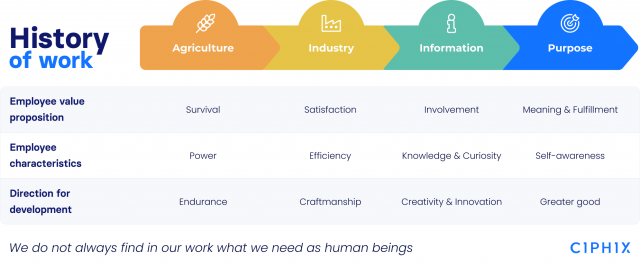Did you ever meet someone with real anxiety? It’s tough. There is no real reasoning behind it. Panic is at the door. I used to work at an airline, and a common fear is the fear to fly. It could be a combination of multiple anxieties, like fear of heights and claustrophobia. Or an irrational fear the plane will somehow malfunction and crash when you are on it. Just explaining that a plane is a safer way to travel than driving a car will not do the trick.
Fear of change
There is some comparison to introducing automation into an organization. At every key-note I gave, at every panel I was on to talk about Robotic Process Automation or AI, there would be a question related to Automation Anxiety. People are afraid robots will take their jobs. They are afraid to rely on some sort of digital assistant. They fear change.
But the world is changing continually. The way we work is changing. So what is expected of us at our job is also changing. The history of work is showing that automation really here to stay. Therefore shifting what we as employees should master. RPA is here to stay as well. So how can we help our fellow humans overcome this fear of robots and automation?
Don’t panic
Fear tends to result in panic, which makes us do crazy things. So what can we do? We could try some of the things that help people to cope with the fear of flying. Let’s cope with Automation Anxiety as well:
Step 1: Know what to expect
There is this Dutch saying stating ‘a farmer does not eat anything he is not familiar with’. So when knowledge is better, understanding is king.
Be clear about what the purpose is in your company for automation. Have a clear plan. Is it Quality? Productivity? Compliance? Is it cost savings or a combination of all of the above? Be clear. Be honest. Be prepared for tough conversations but help your organization understand the purpose of your automation endeavors.
Step 2: Familiarize people with technology
Closely connected to the previous point, get people connected to the topic. Have them create their own simple bot. Visualize often. Showcase in a fun and engaging way. It’s not about the ROI, it’s about the Return on Experience. Upskill your people so they really know what RPA or Automation, in general, will bring and how they can benefit from it.
Step 3: Be positive
Think in possibilities. It’s important to foster a growth mindset. Some things are inevitable. We can try to fight against all odds, or join forces with automation and see how we can be augmented as humans. This way we are able to take the robot out of the human, out of our work. This opens up what we love as humans: collaboration problem solving and above all, creativity.
Be patient with those who fear. But actively onboard them on your automation journey. Face their fear together. Are you ready for take-off? ?
Column by Asher Lake

